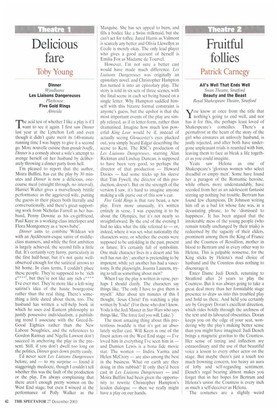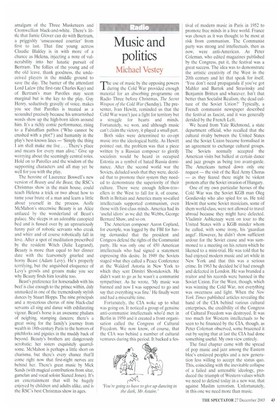Fruitful follies
Patrick Carnegy
All's Well That Ends Well Swan Theatre, Stratford Beauty and the Beast Royal Shakespeare Theatre, Stratford
you know at once from the title that nothing's going to end well, and nor has it for this, the perhaps least loved of Shakespeare's comedies. There's a permafrost at the heart of the story of the girl who ensnares an unlovely husband, is justly rejected, and after both have undergone unpleasant trials is reunited with him, leaving them to face as bleak a life together as you could imagine.
Yeats saw Helena as one of Shakespeare's 'glorious women who select dreadful or empty men'. Some have found her a paragon of the Romantic heroine, while others, more understandably, have recoiled from her as an adolescent fantasist stirring up nothing but trouble. Bertram has found few champions, Dr Johnson writing him off as a bad lot whose fate was, in a devastating phrase, to be 'dismissed to happiness'. It has been argued that the intolerable mess of the young people (who remain totally unchanged by their trials) is redeemed by the sagacity of their elders, prominent among them the King of France and the Countess of Rossi[lion, mother in blood to Bertram and in every other way to Helena. This is palpable nonsense, for the King sticks by Helena's mad choice of husband and the Countess does nothing to discourage it.
Enter Dame Judi Dench, returning to Stratford after 24 years to play the Countess. But it was always going to take a great deal more than her formidable stage presence to draw us into this troubled play and hold us there. And held you certainly are by Gregory Doran's excellent direction, which rides boldly through the archness of the text and its laboured obscurities. Doran keeps you on the edge of your seat, wondering why the play's making better sense than you might have imagined. Judi Dench brings a magnetic gravitas to the Countess. Her sense of timing and inflection are extraordinary and the use of that beautiful voice a lesson to every other actor on the stage. But maybe there's just a touch too much frowning concern, too heavy an aura of lofty and self-regarding sentiment. Dench's regal bearing almost makes you forget that in her hopes for Bertram and Helena's union the Countess is every inch as much a self-deceiver as Helena.
The costumes are a slightly weird amalgam of the Three Musketeers and Cromwellian black-and-white. There's little that Jamie Glover can do with Bertram, a priggishly 'unseasoned courtier' from first to last. That fine young actress Claudie Blakley is in with more of a chance as Helena, injecting a note of vulnerability into her lunatic pursuit of Bertram, The follies of the young and of the old leave, thank goodness, the undeceived players in the middle ground to save the day. The banter of the attendant Lord Lafew (the first-rate Charles Kay) and of Bertram's man Parolles may seem marginal but is the key to the play. Guy Henry, seductively gravelly of voice, makes you see that Parolles is treated as a scoundrel precisely because his unvarnished words show up the high-born idiots around him. It's a richly comic performance, rising to a Falstaffian pathos ('Who cannot be crushed with a plot?') and humanity in the play's best-known lines — 'Simply the thing I am shall make me live . . There's place and means for every man alive.' Give up worrying about the seemingly central roles. Hold on to Parolles and the wisdom of the supporting characters and all may yet be well for you with the play.
The heroine of Laurence Boswell's new version of Beauty and the Beast, the RSC's Christmas show in the main house, could teach Helena a trick or two about how to tame your brute of a man and learn a little about yourself in the process. Aoife McMahon's streetwise Beauty is an Alice unfazed by the wonderland of Beast's palace. She sleeps in an adorable canopied bed and is fussed over by an uproariously funny pair of robotic servants who creak and whirr and of course robotically fall in love. After a spot of meditation prescribed by the resident Witch (Julie Legrand), Beauty is more than equal to her dinner date with the fearsomely gnarled and horny Beast (Adam Levy). He's properly terrifying, but the anguished eloquence of Levy's growls and groans make you see why Beauty finds him lovable too.
Beast's preference for horseradish with his beef is clue enough to the prince within, duly unmasked in one of the tremendously stylish dances by Stuart Hopps. The nine principals and a mysterious chorus of nine black-clad servants all sing and dance with exhilarating vigour. Beast's horse is an awesome phalanx of neighing, stamping dancers; there's a great swing for the family's journey from wealth in 18th-century Paris to the horrors of pitchforks and pigsties in the muddy back of beyond. Beauty's brothers are dangerously acrobatic: her sisters exquisitely quarrelsome. McMahon is perhaps a little short on charisma, but there's every chance that'll come right now that first-night nerves are behind her. There's great music by Mick Sands (with magical contributions from sitar, gamelan and vocal soloist Sianed Jones). It's an entertainment that will he hugely enjoyed by children and adults alike, and is the RSC's best Christmas show in ages.



























































 Previous page
Previous page